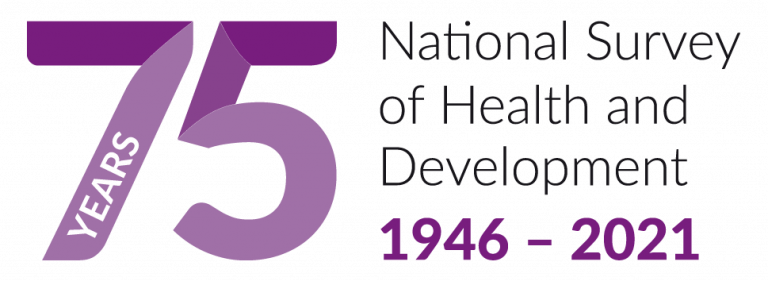The National Survey of Health and Development celebrates it's 75th Birthday
1 March 2021
This month we celebrate the National Survey of Health and Development’s (NSHD) 75th Birthday. NSHD is the longest continually studied birth cohort in the history of science and has been funded by the Medical Research Council (MRC) since 1962.

During the 1930s and 1940s there were worries about the falling birth rate in the UK, and concerns that perhaps, in those years before the National Health Service, the cost of having children was so great that people were deterred from parenthood. A survey was designed to look into the low birth rate problem by investigating the cost of childbirth and the availability, use and effectiveness of maternity services, and to provide information for use in the design of the NHS. That study took as its subjects all the 16,695 births which occurred in England, Wales and Scotland during a week in March 1946.
Information on 13,687 babies was collected by health visitors when the babies were eight weeks old. Two different questionnaires were handed out; Questionnaire “A” asked about the use of maternity services, while Questionnaire “B” focused on the cost of pregnancy and childbirth. Survey results showed not only the high cost of having a baby, but that it was proportionally much more expensive for mothers in manual workers’ families than for those who were better off.
The study described a wide range of risks to the life and health of mothers and babies, and found these risks were much greater for poor families than for others. It also revealed that only one in five mothers had received pain relief during childbirth, and this information was used to change the law to permit midwives to give pain relief without a doctor present.
After the success of the Maternity Survey, a follow-up study was designed to examine the health and progress of around one third of the babies studied in the original Maternity Survey. This study was initially called the National Survey of Health and Development of Childhood, later renamed to just the National Survey of Health and Development. Selection of the 5,362 babies studied was carried out at random, but in such a way as to ensure a good representation of babies from all over the country and from all parts of society.
These babies have now been followed up 25 times through a combination of paper questionnaires, online questionnaires and visits by health visitors or nurses in the home or in a clinic. During childhood, the main aim of the NSHD was to investigate how the environment at home and at school affected physical and mental development and educational attainment. During adulthood, scientists investigated how childhood health and development and lifetime social circumstances affected adult health and function and how these change with age. Now, as participants are in their seventies, the research team is developing the NSHD into a life course study of ageing. More recently we have been able to utilise the vast amount of life course information we have, in combination with new data collections, to further understand the impact of COVID 19 and assist with developing COVID 19 health policies.
To celebrate the 75th Birthday we held a series of talks about the NSHD recent findings, as well as the history of the study. To listen to the talks: https://www.nshd.mrc.ac.uk/75th-birthday/talks-series/
 Close
Close

